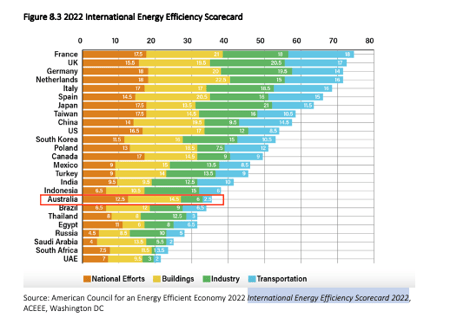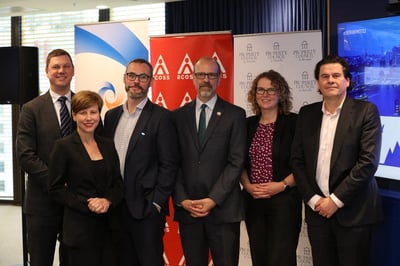What is the EEC’s take on the NEPS?
Improved energy performance driven by efficient electrification is vital to emissions reductions and mitigating the impact of global energy shocks.
This is the view of the Energy Efficiency Council (EEC) in its submission to the federal government’s National Energy Performance Strategy (NEPS) consultation paper.
The EEC produced a 103-page submission by invitation, responding to every question put forward in the paper.
Let's take a closer look.
Basis of the submission
The EEC strongly supports the NEPS and encourages the government to commit to an ambitious but achievable target and to improving energy efficiency.
The reasoning behind EEC’s support:
- Improved energy performance lowers bills and emissions, and enhances wellbeing through healthier and more comfortable buildings
- A well-designed strategy with clear policy signals is crucial for guiding investment
- We need governance and market reforms, including well-targeted regulation, to realise the potential benefits of improved energy performance
- Industry needs guidance, assistance, motivation and incentives to improve energy performance and to decarbonise
- Improving the performance of residential buildings is critical to the energy transition, especially for homes built before the minimum energy efficiency standards were introduced
- We need to ramp up efforts to help consumers to improve energy performance.
Summary of the main points of the submission
One of the EEC’s key findings is that improving energy performance is an important strategy for mitigating global energy crisis impacts in Australia and reducing our exposure to global energy shocks.
It sees electrification as an important immediate step to deliver rapid improvements to energy performance and emissions reductions. To keep costs down though, this must be done in an efficient manner.
The submission makes a list of recommendations:
- NEPS Governance – the NEPS should include informed, measurable, energy efficiency targets that are consistent with emissions reduction targets. Progress against NEPS should be included in the minister’s annual climate change statement to parliament
- Market reform – a national energy performance body should be established, and a demand-side taskforce set up to reform national energy laws
- Industrial decarbonisation – the NEPS should expand its resources to support all energy-intensive businesses and provide incentives to industry to improve performance
- Buildings – the strategy should incorporate a long-term plan for improving the energy performance of buildings, and the National Construction Code should be regularly updated in line with this. A national energy performance rating system for residential buildings should be urgently deployed
- Appliances – energy standards should be reformed to be more in line with international standards
- Transport – the government should urgently introduce ambitious standards for fleet economy light vehicles
- Energy efficiency schemes – the federal government should work with state and territory governments to expand energy efficiency schemes, and commit to promoting greater national consistency
- Cross-cutting issues – the NEPS should commit to comprehensive data collection on the energy workforce, and explore a range of financing models.

The submission also includes an action plan, prioritised in order of urgency. Top of the priority list is the finalising of an energy performance ratings system for residential buildings, and the implementation of ambitious corporate fuel economy standards.
The top three priorities
Luke Menzel, CEO of the EEC, says there is a huge amount of work to be done.
But he also believes that some of the failures of previous strategies came from “trying to do everything”. For this reason, he recommends focusing on three key areas that will help us to make significant progress really quickly.
These are:
1. Governance
Improving governance will help bring all facets of the market together, and eliminate fragmentation.
This encompasses energy market rules, focussing on the demand side, development of policy and programs, and creating connectivity between the various organisations and bodies.
Menzel describes this as making sure there is “connective tissue” between all the different regulatory regimes – i.e. across buildings, industry, and energy markets.
He also believes there is a case for a new, separate body that can carry all those issues.
“Until then, it will be hard to have the joined-up conversations that we need to have in this nation”.
2. Residential rehabilitation
This involves fixing the millions of poorly performing buildings across the nation, particularly those built before 2005. Menzel describes this as a “critical KPI for the energy transition and a huge job."
This will need to include a clear national framework for energy performance, and to address the surrounding issues – such as skills, supply chains, finance and support for vulnerable households.
“We need to roll up our sleeves and get stuck in,” he says.
3. Industrial decarbonisation strategy
At this point we don’t have a comprehensive strategy for industrial decarbonisation, particularly for entities not covered by the emissions Safeguard Mechanism, says Menzel.
He points out there is not much policy that engages small to medium manufacturers and industrial businesses that often have a significant energy spend and carbon load.
“These are organisations that have a lot of opportunity to cut their bills and emissions,” he says.
Menzel asserts that the government should “embark on an industrial decarbonisation strategy that sets out a clear pathway for all the subsectors within the industrial space to decarbonise.”
This should align state and federal programs and provide clear guidance as to what the expectations are.
What can we do right now?
In the meantime, Menzel says, there is a lot we can do. This includes metering, monitoring, using energy management systems, supporting the work by ARENA, and building a strong skills base.
He also suggests building up supply chains for some of the innovative technology that exists in other parts of the world, but that is not currently available in Australia.
Menzel believes that doing some of these things right now will be “incredibly helpful” towards meeting our energy performance targets and goals.
The full submission by the EEC can be accessed here.
Energy Monthly
Get a different perspective on energy with our monthly newsletter.
Up next
.png)

Creating clarity during the energy transition.
Get a different perspective on energy with our monthly newsletter.

All rights reserved Energy Insights Pty Ltd




